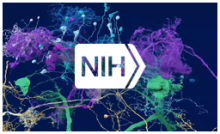
This week, a series of daily blog posts highlight 28 new and reissued BRAIN Initiative notices of funding opportunities (NOFOs) for 2021. Today’s post features three NOFOs for research teams working to develop integrative, novel methods to elucidate neural circuits and funding for data analysis, archiving, and standardization.
Understanding Neural Circuits
The first three awards aim to bring together interdisciplinary teams of investigators (e.g., neurobiologists, statisticians, physicists, engineers, and others) to advance our understanding of the neural circuit basis of perception, emotion, cognition, and behavior by using cutting-edge technologies. All proposed projects should use innovative tools to examine the neural circuitry of cognitive processes, such as sensation, perception, emotion, decision-making, and/ or navigation. The use of multiple species, ranging from humans to other mammals and invertebrates, is encouraged.
RFA-NS-20-029 Exploratory Team-Research BRAIN Circuit Programs – eTeamBCP (Reissue of RFA-NS-18-029; U01)
This NOFO supports interdisciplinary research teams seeking to take an exploratory approach to elucidate how circuit activity underlies a behavioral or neural system. Applicants are encouraged to propose challenging goals that only a synergistic team can accomplish. Projects should be intended to develop experimental capabilities and theoretical frameworks in preparation for larger-scale efforts, including the multi-component Team-Research BRAIN Circuit Programs – TeamBCP (see below). Applications are due on June 15, 2021.
RFA-NS-19-002 Team-Research BRAIN Circuit Programs – TeamBCP (Clinical trial required; U19); RFA-NS-19-003 (Clinical trial not allowed; U19) (Reissue of RFA-NS-17-018)
This pair of NOFOs support interdisciplinary research teams from prior BRAIN technology and/ or integrated approaches teams, and/ or new projects from the research community that focus on employing innovative technologies to study the neural circuitry of behavior. These NOFOs solicit proposals that can greatly advance our understanding of circuit function within 5-plus years with a possibility of one renewal. Applications for both awards are due on October 29, 2021.
For inquiries regarding the above NOFOs, please contact braincircuits@nih.gov.
Neurobiology of Pain and Endogenous Opioids
BRAIN aims to understand how neural circuit activity translates to sensory, emotional, and cognitive functions, all of which are closely related to or controlled by pain circuits and/ or endogenous opioid systems. Pain conditions and the opioid crisis are important national public health concerns. As such, the BRAIN Initiative is now funding projects to elucidate the basic neurobiology and circuits of pain processing, analgesia, and the brain mechanisms implicated in opioid use.
Please see notices NOT-NS-18-008 (pain) and NOT-DA-10-046 (opioids) for more details.
Data Science and Standardization
The BRAIN Initiative and neuroscience as a whole are generating massive amounts of data that span modalities, spatiotemporal scales, and species. Largely driven by recent innovations in high-throughput -omics profiling, optical microscopy, electrophysiological recording, and macroscale neuroimaging, brain data is rapidly growing. The NOFOs below support new approaches to analyze, archive, and standardize the collection of these data. For all awards collaborations with scientists from other disciplines are encouraged.
RFA-MH-20-120 Secondary Analysis and Archiving of BRAIN Initiative Data (R01)
This new NOFO supports secondary analysis or data mining of large quantities of data related to the BRAIN Initiative. Specifically, investigators can propose to enhance the value of existing data by harnessing novel data analytic methods, data science techniques, and machine learning approaches. These data do not have to be held in a BRAIN Initiative archive but must be in an archive that is easily accessible to the research community. Applications are due on February 26, 2021.
RFA-MH-20-600 Data Archives for the BRAIN Initiative (Reissue of RFA-MH-19-145; R24)
This NOFO seeks applications to develop web-accessible data archives to capture, store, and curate data related to the BRAIN Initiative. Data teams are expected to work with researchers to incorporate tools that allow users to analyze and visualize data. The creation of tools and data description standards is not required, but the data archive must be made broadly available and accessible to the research community. Applications are due on July 14, 2021.
RFA-MH-20-128 Standards to Define Experiments Related to the BRAIN Initiative (Reissue of RFA-MH-19-146; R01)
This NOFO solicits applications to develop data standards needed to describe the new experiments generated by the BRAIN Initiative. Proposals should include plans to gather community input at all stages of the process. Data sharing between key groups in the experimental community is encouraged to ensure that data standards encompass data collection efforts across all groups. Applicants are strongly encouraged to follow the development pathway described in the NOFO. Applications are due on September 2, 2021.
RFA-MH-19-147 Integration and Analysis of BRAIN Initiative Data (Reissue of RFA-MH-17-257; R01)
This NOFO solicits applications to develop software to analyze, visualize, and integrate data as part of the BRAIN Initiative’s effort to build an informatics infrastructure. As part of a larger infrastructure (supported by RFA-MH-19-146 and RFA-MH-19-145) awardees under this award are expected to work together to integrate data visualization and analysis tools into data repositories. The application receipt dates are March 4, 2021.
Many NOFOs in the BRAIN Initiative are now subject to a data sharing requirement (see notice NOT-MH-19-010). Please view related notices in each NOFO to see if an award falls under this policy.
Please visit the BRAIN Initiative’s Funding Opportunities webpage for more details on these and other awards. Did you miss earlier posts this week on FY2021 NOFOs? If so, check out the main BRAIN blog page here.
